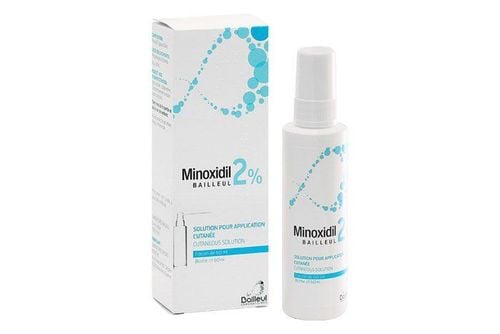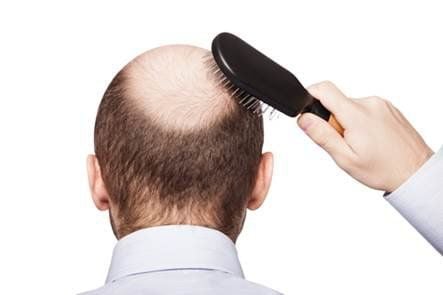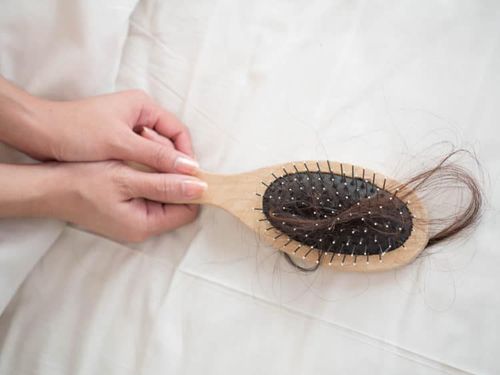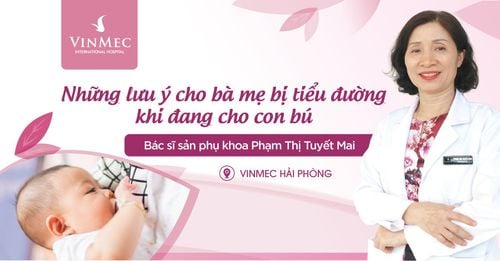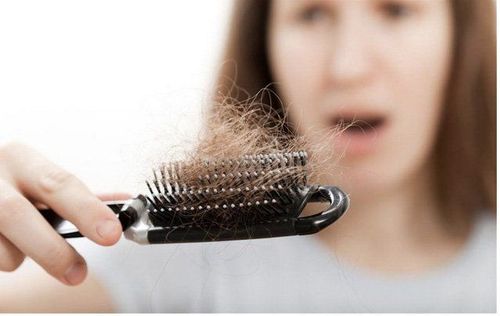This is an automatically translated article.
If you experience postpartum hair loss or post-pregnancy hair loss, you will notice sudden, sometimes clumps of hair loss occurring for six months after giving birth. So, why do you lose a lot of hair after giving birth and what do you need to do to limit postpartum hair loss?1. Causes of postpartum hair loss
Postpartum hair loss is completely normal. Many first-time moms are surprised to see more hair loss than usual during the first few months postpartum, but that's completely normal. Doctors call it postpartum alopecia (postpartum telogen effluvium).Normally, 85 to 95 percent of the hair on your head is actively growing, while the remaining 5 to 15 percent is in the resting phase. After a period of rest, this hair falls out, usually when you are combing or washing your hair, and is replaced by new hair that grows. The average woman loses about 100 hairs per day.
During pregnancy, increased estrogen levels prolong the developmental stage. There is less hair in the resting phase and less shedding each day, so you can have thicker hair and more hair than before.
However, after you give birth, your estrogen levels plummet and a lot of hair follicles go into a resting phase and start shedding three to five months later. So, within five months, it's likely that you'll have more hair falling out in the shower or looking on the brush.
Not all women notice significant changes in their hair during the postpartum period. Hair loss tends to be more obvious in women with long hair.
You should talk to your doctor about your hair loss if you notice excessive hair loss. Hair loss can be a symptom of anemia or postpartum thyroiditis, which are treatable conditions.
Postpartum hair loss can happen any day after you give birth and sometimes it continues all year long. However, hair loss usually peaks around 4 months postpartum, so you don't need to panic if your baby is a few months old and you're still losing patches of hair.

Rụng tóc sau sinh có thể xảy ra vào bất kỳ ngày nào sau khi bạn sinh con và đôi khi nó tiếp tục kéo dài cả năm
2. What can I do to prevent postpartum hair loss?
You won't be able to stop hair loss, but you can try to make the most of what you have to alleviate postpartum hair loss. Here's what dermatologists recommend:Try a volumizing shampoo. These products often contain ingredients such as proteins that coat the hair, adding to the look of fullness. Avoid conditioning shampoos. The heavy ingredients in these products can make hair look frizzy from weighing it down. Avoid intensive conditioners. These products also contain heavy ingredients that can pull hair down. Use conditioner for soft hair. These products contain lighter ingredients so they won't weigh your hair down. Try hairstyles that cover the thinner sections of your hair. To do this, you can ask your hairdresser for advice and help. Just make sure to avoid scalp-tightening patterns. If you're tired of washing long hair in the shower or brushing strands off the bathroom floor, you can choose to cut your hair short. In addition, a short haircut can be easier to wash and bun when you have to take care of the baby and you need to spend a lot of time taking care of the baby and housework.
Note: If you have long hair, strands can wrap around your baby's tiny body, including his fingers, toes, wrists, ankles, and penis. This is called a tourniquet and it can be painful for your child. If your baby cries for no apparent reason, check carefully for any long hairs that are tightly entangled in any part of the baby.
Besides the ways mentioned above, you can try the following ways:
Eat and drink to ensure adequate nutrition. Including a variety of healthy fruits, vegetables, and proteins in your diet is the best way to ensure your body is getting all the nutrients it needs. Some foods suggested to improve hair health include dark green leafy vegetables (providing iron and vitamin C), sweet potatoes and carrots (providing beta carotene), eggs (providing vitamin D), and fish (provides omega-3 and magnesium).

Hãy đảm bảo rằng bạn ăn đầy đủ các chất dinh dưỡng
Currently, the hair loss treatment method used at Vinmec International General Hospital is the technique of injecting drugs directly into the lesion.
This method applies to subjects with hair loss in patches or diffuse hair loss. The technique of injecting drugs directly into the lesion should be performed at a reputable medical facility such as Vinmec International General Hospital because of advantages such as:
Experienced and well-trained doctors Simple, safe, low cost. A sterile environment, safe for patients.
Please dial HOTLINE for more information or register for an appointment HERE. Download MyVinmec app to make appointments faster and to manage your bookings easily.
Reference source: babycenter.com; healthline.comSEE ALSO:
Causes of postpartum hair loss Hair loss in women: What you need to know Does postpartum hair loss go away on its own?





